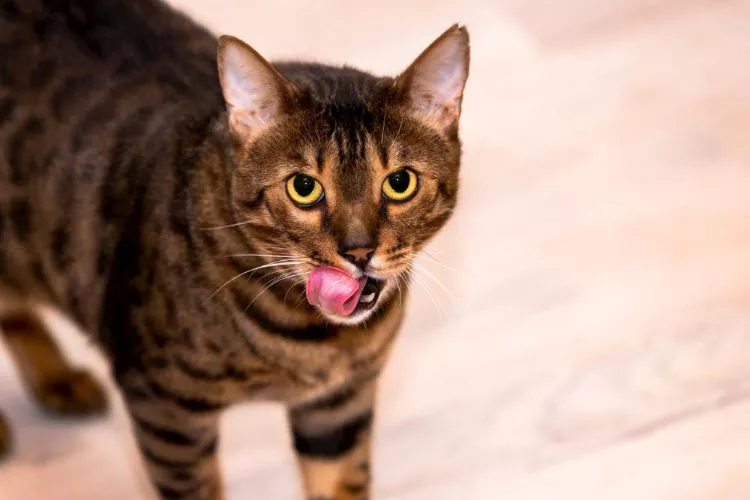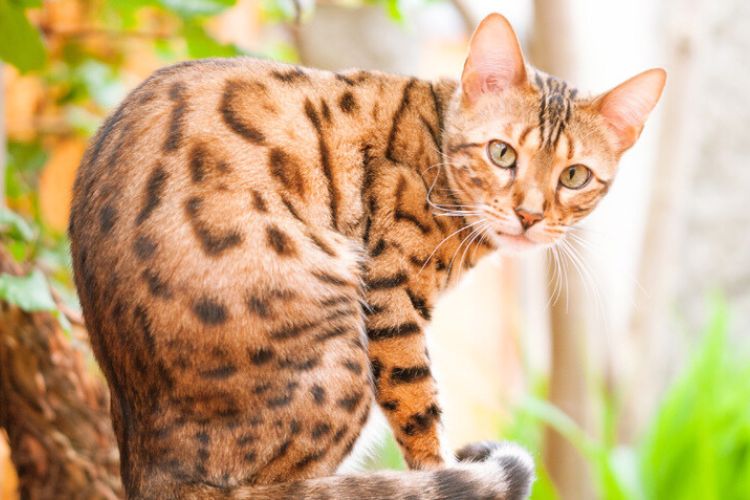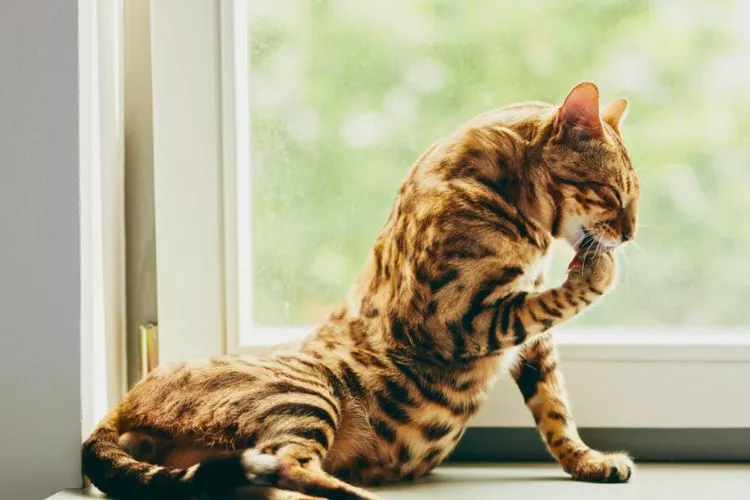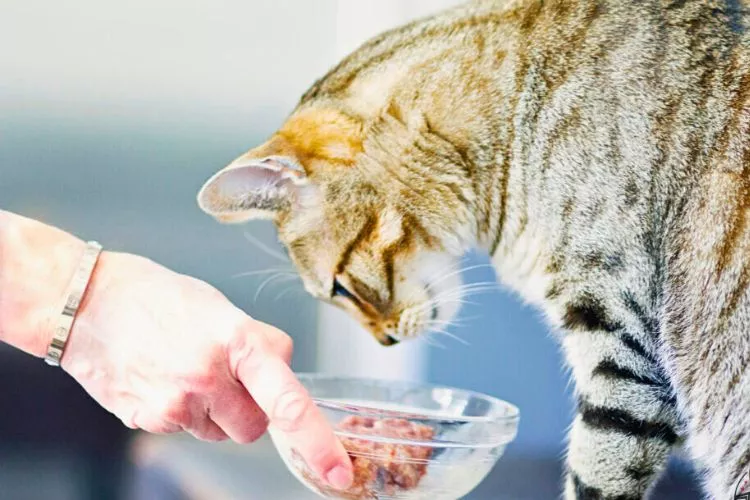In the world of domestic felines, Bengal cats stand out for their unique and striking appearance, often characterized by their exquisite marbled or spotted coats.
As a breed with a wild ancestry, thanks to its partial descent from the Asian leopard cat, the Bengal cats are known for their high-energy and athletic nature.
But, do Bengal cats deed a specific diet as well?
Well, many Bengal cat owners may wonder if their feline companions have specific dietary requirements that differ from other breeds.

In this article, we will explore:
- The origins of Bengal cats and their implications on dietary needs.
- Common myths and misconceptions surrounding Bengal cat nutrition.
- Expert advice and tips on designing a suitable diet plan for your Bengal cat.
🐾 Do Bengal cats need a specific diet?
Yes, Bengal cats do require a specific diet tailored to their unique needs. Due to their wild heritage and high-energy nature, Bengal cats have a higher demand for protein and essential nutrients.
A well-balanced diet for a Bengal cat should consist of high-quality, grain-free, and nutritionally dense wet or raw food, with an emphasis on protein derived from animal sources.
Providing Bengal cats with a diet that closely mimics their ancestral diet can help ensure optimal health, longevity, and the well-being of these captivating felines.
Origins of Bengal Cats and Implications on Dietary Needs
The Bengal cat is a relatively new breed created intentionally by crossbreeding the domestic feline with the wild Asian leopard cat (Prionailurus bengalensis).
The initial crossbreeding occurred in the 1960s, and the breed gained recognition in the 1980s.
This fusion of wild and domestic genetics has given the Bengal cat its exotic appearance, playful temperament, and athletic build.The wild ancestry of Bengal cats has a significant impact on their dietary needs.
In their natural habitat, Asian leopard cats are carnivorous, preying primarily on small mammals, birds, and insects.
Their diet is high in protein, moderate in fat, and has a minimal presence of carbohydrates. While Bengal cats are primarily domesticated, their genetic makeup still influences their dietary requirements.

Bengal cats have a higher metabolism and higher energy levels compared to other domestic cats. This makes it crucial for them to consume a diet that is rich in good quality, animal-based protein.
Their diet should closely mimic the natural food sources of their wild ancestors, which primarily consists of raw or minimally processed meat with a careful balance of essential nutrients such as vitamins, minerals, and amino acids.
It’s also important to note that Bengal cats may not thrive on generic store-bought cat food that contains high levels of carbohydrates, artificial additives, or plant-based protein.
These ingredients may contribute to health issues such as obesity, urinary tract problems, and digestive issues.
Common Myths and Misconceptions Surrounding Bengal Cat Nutrition
Despite the growing popularity of Bengal cats, there remain several myths and misconceptions about their nutritional requirements.
Below, we address and debunk some of these common misconceptions:
- Bengal cats can eat the same food as any other domestic cat: While some Bengal cats may tolerate generic cat foods, this breed generally requires a higher-quality, protein-rich diet with minimal filler ingredients like grains, and plant-based proteins due to their wild ancestry. To ensure optimum health, focus on a diet that closely mirrors the animal-based protein sources their wild counterparts consume.
- Bengal cats require raw meat in their diet at all times: Although many Bengal cat owners promote a raw diet, it is not the only option. High-quality canned or freeze-dried wet food containing animal protein and essential nutrients can also fulfill Bengal cats’ nutritional needs. If you opt for a raw diet, be mindful of food safety and ensure a balanced intake of essential nutrients.
- Bengal cats cannot tolerate any carbohydrates: While it’s true that Bengal cats thrive on a low-carbohydrate diet, they can still tolerate some carbohydrates. Small amounts of vegetables or fruits can provide essential micronutrients and fiber in their diet. However, focus on keeping carb intake minimal, prioritizing protein from animal sources as the central element in their meals.
- Homemade diets are always superior for Bengal cats: Homemade diets can be beneficial for Bengal cats, but only if they provide all the necessary nutrients in appropriate amounts. An imbalanced homemade diet might result in deficiencies or excesses that can lead to health issues. If you decide to prepare a homemade diet, consult with a veterinarian or a certified pet nutritionist to design a balanced meal plan specific to your Bengal cat’s needs.
Advice and Tips on Designing a Suitable Diet Plan for Your Bengal Cat
Bengal cats have specialized dietary needs due to their wild heritage. Below are some expert tips to help you provide the appropriate nutrition for your Bengal cat:

- Prioritize Animal-based Proteins: Bengal cats need animal-based proteins to thrive. Whether you choose wet, dry, or raw cat food, ensure high-quality animal proteins are listed as the primary ingredients.
- Limit Carbohydrates: Low carbohydrate intake aligns with the natural diet of wild Bengal cats’ ancestors. Many commercial cat foods contain fillers, such as corn, wheat, and soy, which are not beneficial for Bengal cats.
- Provide Balanced Fats: The right type of fat is crucial. Omega-3 and omega-6 fatty acids promote healthy skin and coat, support overall health, and provide a crucial energy source. Foods like fish and flaxseeds are excellent sources.
- Ensure Essential Nutrients: Make sure the diet covers all essential vitamins, minerals, and amino acids, especially taurine. Consult with a vet or pet nutritionist to ensure the diet meets these needs.
- Hydration is Key: Bengal cats, like all cats, have a low thirst drive, affecting their water intake. Wet food diets or direct watering can help keep them hydrated to prevent urinary and kidney illnesses.
- Consult a Vet: Always consult with a vet before making significant changes to your pet’s diet, especially if transitioning to a raw or homemade diet.
Creating a suitable diet plan for a Bengal cat isn’t overly complex, but it does require an understanding of their specific needs. By incorporating these tips, you can help ensure that your Bengal cat is receiving a diet that will support their wellbeing and longevity.
🐾 Best Food for Bengal Cats
Due to Bengal cats’ distinctive dietary requirements, it’s crucial to choose food products that meet their nutrition needs. Here’s a look at the best dry and wet food for Bengal cats:

Best Dry Food for Bengal Cats
When it comes to choosing an ideal dry food for Bengal cats, the top criteria should involve quality protein sources, low carbohydrate content, and the absence of filler and artificial ingredients. A few top-selected brands are:
- BLUE Buffalo Wilderness Dry Cat Food: Inspired by the diet of the lynx, this high-protein diet made with real chicken promotes muscular health essential for Bengal cats.
- Orijen Biologically Appropriate Dry Cat Food: Crafted to mimic the natural evolutionary diet of wild cats, this food contains 90% quality animal ingredients, providing a protein-rich, low-carb diet.
- Natural Balance L.I.D. Green Pea & Duck Dry Cat Food: This is a limited-ingredient diet made with a novel protein source – duck, which can be particularly beneficial for Bengals with food sensitivities.
Best Wet Food for Bengal Cats
Wet food can be an excellent way to ensure your Bengal cat stays hydrated and receives a high amount of animal-based proteins. Here are some top choices:
- Weruva Grain-Free Canned Cat Food: This wet food brand offers high-quality, grain-free options with a variety of real meat like chicken, tuna, and salmon.
- Fancy Feast Classic Collection Adult Wet Cat Food: Despite being conventional, this brand is approved by many Bengals due to its high meat content. It provides variety with flavors such as chicken, beef, or fish.
- Ziwi Peak Canned Cat Cuisine: Ziwi Peak offers an all-natural, grain-free canned diet with 93% meat, organs, and New Zealand green mussels. It mimics a whole prey diet, ideal for meeting Bengals’ protein requirements.
Remember, the quality and content of the food you serve your Bengal cat are far more crucial than the form it takes.
Whichever you choose, ensure it’s nutritionally balanced, sourced from quality ingredients, and has plenty of animal protein to keep your Bengal cat healthy and satisfied.
🐾 frequently asked question (FAQs)
The best food for a Bengal cat consists of high-quality, animal-based protein sources, low carbohydrates, and balanced nutrients. Wet, dry, or raw diets that are grain-free and nutritionally dense are ideal.
Bengal cats should avoid foods with excessive carbohydrates, plant-based protein, artificial additives, grains, onions, garlic, chocolate, caffeine, alcohol, and high-lactose dairy products. These can lead to health issues and digestive problems.
Yes, Bengal cats should ideally be on a grain-free diet. Grains are unnecessary carbohydrates that can cause digestive issues, and they don’t provide the necessary nutrients for Bengal cats.
The amount a Bengal cat should eat depends on the cat’s age, weight, activity level, and the type of food being fed. Generally, adult Bengal cats should eat approximately 4-6 ounces of wet food or about 1/2 – 3/4 cup of dry food per day, divided into two meals. Always consult with a vet for accurate guidelines based on your cat’s specific needs.
Conclusion :
To conclude, it is quite apparent that Bengal cats do indeed necessitate a specific diet to maintain optimum health and imitate their natural eating habits as closely as possible.
- Bengals are known to have a higher protein requirement compared to other domestic cats, attributed to their wild lineage. A high-quality diet rich in animal-based proteins is therefore essential.
- Animal-based fats should be a part of their diet as Bengals have difficulty digesting vegetable-based fats.
- Their diet should also include sufficient levels of taurine, amino acids, and arachidonic acid. These nutrients are primarily found in animal-based foods.
- A combination of both dry and wet food could be beneficial in order to provide variety and cater to different nutritional needs.
In essence, one should aim for a balanced, high-quality diet for Bengal cats that closely mirrors their natural diet in the wild.
By doing so, one can ensure a long, healthy, and vibrant life for these extraordinary felines.
